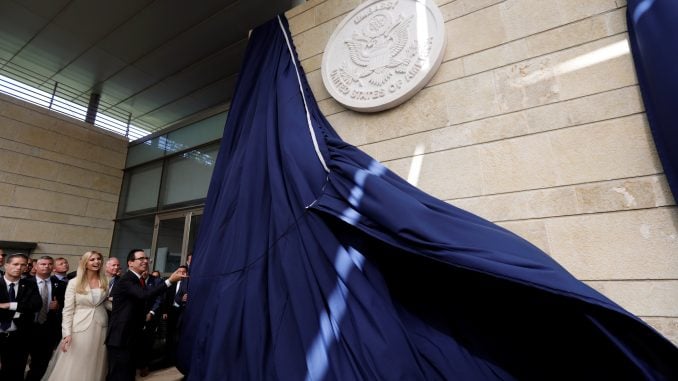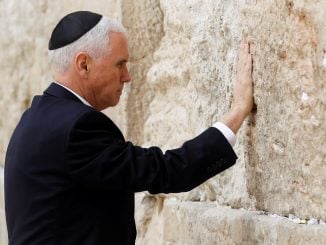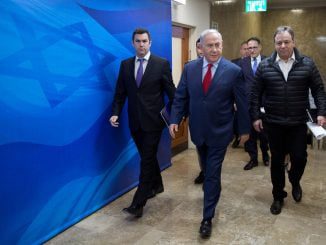

GAZA/JERUSALEM — The high-profile opening of the U.S. embassy to Israel in Jerusalem raised tensions to the boiling point this week. With officials from around the world scheduled to attend the opening ceremony, including Ivanka Trump and Jared Kushner, Israel bolstered security ahead of planned mass protests. In addition to increased military force, Israel dropped leaflets from planes over Gaza that urged residents to stay away from the fence on Monday.
“You deserve a better government. You deserve a better future,” the leaflets said. “Do not approach the security fence nor participate in the Hamas display that is putting you in risk.”
Still, in stark contrast to the dignitaries in Jerusalem, tens of thousands of rioters on Monday burned tires, attacked the cargo trucks carrying supplies between Israel and Gaza and did millions of dollars in damage. It became the bloodiest single day for Palestinians since 2014, Palestinian Health Ministry officials said 58 protesters were killed and 2,700 injured by live gunfire, tear gas or other means. Two more died on Tuesday.
“Today is the big day when we will cross the fence and tell Israel and the world we will not accept being occupied forever,” said Gaza science teacher Ali, who declined to give his last name.
The bloodshed drew calls for restraint from some countries, including France and Britain, and stronger criticism from others, with regional power Turkey calling it “a massacre.”
The White House declined to join in urging Israel to exercise caution and pinned the blame squarely on Gaza’s ruling Hamas group, backing Prime Minister Benjamin Netanyahu who described the Israeli military’s actions as self-defense of his country’s borders.
In siding squarely with Israel, Washington put distance between itself and its European allies for the second time in a week, after angering France, Germany and others last Tuesday by abandoning an international nuclear deal with Iran. Trump said the embassy relocation from Tel Aviv fulfilled a pledge by multiple U.S. presidents, including George W. Bush, Bill Clinton and Barack Obama, by recognizing the holy city as the Israeli capital.
Netanyahu thanked Trump for “having the courage to keep your promises.”
Palestinians seek East Jerusalem as the capital of a state they hope to establish in the occupied West Bank and the Gaza Strip.
Israel regards all of the city, including the eastern sector it captured in the 1967 Middle East war and annexed in a move that is not recognized internationally, as its “eternal and indivisible capital.”
Peace talks aimed at finding a two-state solution to the conflict have been frozen since 2014. The Trump administration says it has nearly completed a new Israeli-Palestinian peace plan but is undecided on how and when to roll it out.
Trump’s recognition of Jerusalem as Israel’s capital in December outraged Palestinians, who said the United States could no longer serve as an honest broker in any peace process.
A senior Hamas leader, Khalil Al-Hayya, said at a border encampment that Monday’s protest was timed to coincide with the “deplorable crime of moving the U.S. Embassy to Jerusalem.”
He said: “Our people went out today to respond to this new Zionist-American aggression, and to draw by their blood the map of their return.”
Clouds of black smoke from tires set alight by demonstrators rose in the air. Demonstrators, some armed with slingshots, hurled stones at the Israeli security forces, who fired volleys of tear gas and intense rounds of gunfire.
Netanyahu blamed Hamas for the Gaza violence.
“Every country has an obligation to defend its borders,” he wrote on Twitter. “The Hamas terrorist organization declares it intends to destroy Israel and sends thousands to breach the border fence in order to achieve this goal. We will continue to act with determination to protect our sovereignty and citizens.”
Hamas denied instigating the violence, but the White House backed Netanyahu. “The responsibility for these tragic deaths rests squarely with Hamas. Hamas is intentionally and cynically provoking this response,” White House spokesman Raj Shah told reporters.
Kushner said it was possible for both sides in the conflict to gain more than give in any peace deal. “Jerusalem must remain a city that brings people of all faiths together,” he said in a speech.
But Palestinian President Mahmoud Abbas said the United States had opened an “American settlement outpost in East Jerusalem.” He announced a general strike on Tuesday.
Unlike the Obama administration which had a strained relationship with Netanyahu, Trump has firmly supported the Israeli leader.
The Pentagon confirmed it had deployed additional U.S. Marine guards to temporarily bolster security at several U.S. embassies after the violence but declined to say which ones. A U.S. official, speaking on condition of anonymity, confirmed the deployments bolstered security at U.S. embassies including Israel, Jordan and Turkey.



